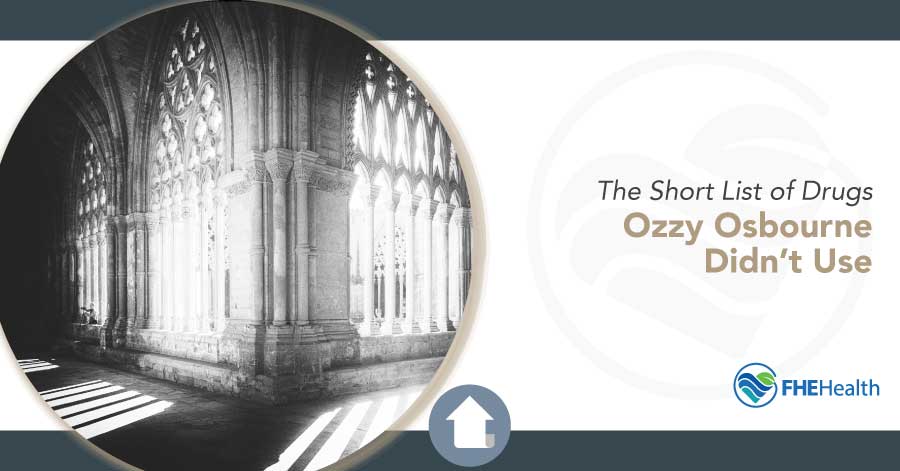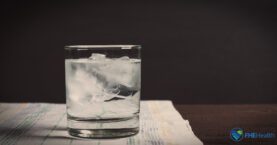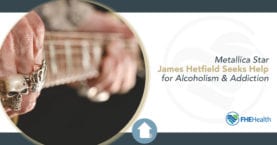
“I left a 20 sack of coke in the forest behind my house as a peace offering with the bats and when I went back to hunt for dinner, the bag was gone but the bloody wankers left a pile of bat droppings in my dime bag. That was when I decided that those ***** were not worth my apology. So I brought the dime bag of coke and bat droppings back to the house and Sharon and I just mixed it all up in the blender and snorted it.”
For nearly 40 years, former Black Sabbath frontman Ozzy Osbourne lived the ultimate sex, drugs and rock ‘n’ roll lifestyle. Cycling through almost every addictive drug there’s a name for, Ozzy spent most of the period between 1967 and 2006 living in a blur of heavy use, jail time, inpatient care facilities and continued use. Later in life, he became a public figure as much for the consequences of that lifestyle as he had been for living it during heavy metal’s heyday.
Need Help?
Treatment can begin quickly and discreetly, get started now
Early Life
Ozzy Osbourne grew up in postwar Birmingham, UK, which had developed into a grim, depressed industrial town with very few opportunities. Born a working class boy with dyslexia and a knack for getting into trouble, John Michael “Ozzy” Osbourne was by his own admission a poor student. After hearing a Beatles song in 1962, at the age of 14, he decided to become a world-famous musician. At 15, he dropped out of school and went to work as a laborer on a construction site. As he later put it in his autobiography, I Am Ozzy:
“I was fifteen when I left school. And what did I get to show for my ten years in the British education system? A piece of paper which said:
‘John Osbourne attended Birchfield Road Secondary Modern.
Signed, Mr Oldham (Headmaster)’
That was ****ing it. Not a single qualification. Nothing. I had two career choices: manual labour or manual labour.”
Over the next several years, Ozzy worked as a laborer, a plumber’s apprentice, a horn tuner at a car factory and a slaughterhouse worker. He also dabbled in petty theft, at one point dropping a television he was stealing from a second-story window. When the 17-year-old Ozzy was caught stealing clothing from a shop to sell at the local pub, his father refused to pay the fine and he was sentenced to jail for six weeks. It was there he got his signature O-Z-Z-Y knuckle tattoos.
“My father always said I would do something big one day. ‘I’ve got a feeling about you, John Osbourne,’ he’d tell me after he’d had a few beers: ‘You’re either going to do something very special, or you’re going to go to prison.’
And he was right, my old man. I was in prison before my eighteenth birthday.”
After his release, Ozzy returned to a series of manual labor jobs.
Need Help?
Treatment can begin quickly and discreetly, get started now
Polka Tulk Blues Band to Earth
In 1967, Ozzy joined the band Rare Breed as a vocalist. Rare Breed had recently been started by Ozzy’s friend from school, Geezer Butler. The band played two or three gigs and broke up. In 1968, both Geezer and Ozzy joined another band, Polka Tulk Blues Band, with guitarist Tony Iommi and drummer Bill Ward. After a few paying gigs, the band changed its name to Earth and later to Black Sabbath.
Early Addiction
Ozzy was a working class lad from Birmingham who grew up in a culture where men drank their wages every evening at the pub. His own drinking started before he left school, and it only grew heavier when he transitioned to a full-time career in music. By 1968, he and his friends in the band were regularly smoking marijuana, and in 1971, guitarist Leslie West introduced him to cocaine at an after-show party in a hotel room.
“When you come from [Ozzy’s working class neighborhood in Birmingham] and you fall in love with cocaine, you remember when you started. It’s like having your first ****! The world went a bit fuzzy after that.”
For the rest of the 1970s, all of the band’s members used various drugs heavily, but Ozzy beat them all for sheer volume and intensity. According to bandmate Iommi, the recording sessions for Never Say Die! dragged on because of the band’s heavy drug use:
“We were getting really drugged out, doing a lot of dope. We’d go down to the sessions and have to pack up because we were too stoned; we’d have to stop. Nobody could get anything right, we were all over the place, everybody’s playing a different thing. We’d go back and sleep it off and try again the next day.”
Ozzy’s own account of his drug use runs the gamut from prescriptions he begged off of cooperative doctors to odd street drugs he picked up from random connections. Years later, he described his use in the late 70s as a litany of drugs and alcohol:
“[I was on] booze, coke, heroin, acid and Quaaludes to glue, cough syrup, Rohypnol, klonopin, Vicodin … On more than a few occasions, I was on all of those at the same time”
By 1979, even the other members of Black Sabbath had had enough. Ozzy was unceremoniously fired from the band and paid out a few hundred thousand dollars to settle his contract. He reacted to the firing by sealing himself inside a hotel suite for three months and spending it all on drugs and parties.
Blizzard of Ozz
At the urging of his future wife, Sharon, Ozzy Osbourne launched a solo career later that year. Somehow accelerating his drug use throughout the 1980s, Ozzy managed to:
- Get arrested and banned from the city of San Antonio for urinating on a memorial to fallen veterans of the Alamo
- Get arrested in Memphis for public intoxication in 1984
- Get arrested in 1989 for a violent incident in which he drunkenly tried to choke his wife, Sharon
During this period, Ozzy’s personal behavior verged from the eccentric to the disturbing. At a meeting with Columbia executives, a heavily intoxicated Ozzy climbed onto the table and performed a striptease for the execs. In 1982, during an interview with MTV, he wandered off into a bizarre tangent about how much he admired Adolf Hitler:
“[Hitler] had a lot of charisma, in a bad way, and I kind of admired him. It was terrible what he did, but he had something about him, y’know? I admired him, not for what he was, but for people … Hey, man, if someone put this in the right way … .”
Ozzy never finished and the interview concluded soon after.
Family Denial and Osbourne Addiction
Sharon said when Ozzy spent days and nights drinking in the early years of their marriage, she chalked it up to the lifestyle of musicians. She didn’t understand that alcoholism was a disease until Elizabeth Taylor’s highly publicized trip to the Betty Ford Center in 1983. Sharon also said she thought her children would be safe from substance abuse because they’d seen their father at his worst and wouldn’t want to follow in his footsteps.
Unfortunately, two of the couple’s three children, Kelly and Jack, also followed in Ozzy’s addiction footsteps. At age 13, Kelly was prescribed Vicodin for tonsillitis and began using it recreationally. She went to rehab for the first time in 2004 at age 17 for prescription drugs, marijuana and alcohol use. As a teen, Jack started drinking to escape feelings of depression but had trouble telling his parents that alcohol had become a problem. He said when he first started drinking, he was focused on the fun and exciting side of what he saw as a never-ending party.
The Role of Reality TV for Ozzy Osbourne and Drugs
Although Ozzy’s early trips to rehab addressed his alcohol issues, the Black Sabbath rocker continued to rely on various substances to cope with the pressures of fame and feelings of depression and worthlessness. While the family’s hit reality show, The Osbournes, brought his music to a new generation, Ozzy says he spent nearly every day of filming “stoned” from 2002 to 2005 according to a 2012 report in the UK Daily Record.
What drugs did Ozzy do? While it’s unclear whether he was referring to cannabis, he referenced smoking a pipe and also taking prescription drugs during that period of his life. In a 2022 interview with the UK publication Mirror, Ozzy said he was also drinking while filming The Osbournes. He reported his kids turned to “drugs and booze” and attributed the family’s lifestyle to “the craziness of having a camera crew at your house 24 hours a day, seven days a week.” Ozzy estimates in addition to drugs, he was drinking about a case of beer every day during his three-year stint on reality TV.
At the height of the show’s popularity in 2003, Ozzy was almost killed in a quad accident and had to recover from horrific physical injuries. The musician broke a neck vertebra, eight ribs and his collarbone. He was airlifted and had emergency surgery after he stopped breathing following the crash. Although there are no reports of Ozzy and heroin, he became dependent on prescription pain pills during recovery from the accident.
Need Help?
Treatment can begin quickly and discreetly, get started now
No More Tears
After several near-death experiences, Ozzy finally achieved several years of sobriety starting in 2006. After a few relatively brief relapses in later years, he found lasting sobriety with the support of his family, his fans and almost daily 12-step meetings.
“When we were in Stockholm on tour, I went to [an AA meeting]. I couldn’t understand a bloody word they were saying, but it still helped. It’s just the act of going there.”
The Shift to Sobriety
Ozzy’s 36-year-old son, Jack, has been sober for 19 years according to a 2021 Variety article. Eventually, Sharon learned the extent of her son’s substance abuse from a family friend and arranged for his first trip to rehab at age 17. At that point, Jack’s struggle shifted to the publicity around his addiction because of his status as the star of the family’s hit MTV reality show, The Osbournes.
While he celebrates nearly two decades sober, Jack is also managing the symptoms of multiple sclerosis. He publicly announced that he was diagnosed with this chronic illness in 2012.
Kelly talked to Extra in 2021 about a recent relapse with alcohol after four years of sobriety. She discussed how the stress of the pandemic led to her attempt to “drink like a normal person” and the realization that she was unable to consume alcohol at all and remain healthy.
Ozzy committed to sobriety and maintained a successful music career. In April 2013, he revealed on his personal Facebook page that he had been using drugs and alcohol for about 18 months, but was again back on the road to rehabilitation. Ozzy had reportedly been sober since that final stint in recovery. As of 2022, he remained focused on his health as he received treatment for Parkinson’s disease.
In 2020, Ozzy released Ordinary Man, his first solo album in nearly 10 years, which debuted at number 3 in the UK. Earlier in 2022, he released his 13th album, Patient Number 9, along with a music video for the title track. He also performed live for the first time in three years at the 2022 Commonwealth Games in Birmingham, England, along with Black Sabbath guitarist, Tony Iommi.
Ozzy and Jack also returned to reality TV on their own terms with the 2018 travel show Ozzy and Jack’s World Tour. Ozzy’s daughter, Kelly, made a guest appearance on the History Channel program and continues to stay busy with her own gigs. She appeared on a season of The Masked Singer and served as a judge on Project Runway Junior and Australia’s Got Talent.
As of October 2022, Kelly was expecting her first child, reportedly a baby boy, with musician boyfriend Sid Vicious of the band Slipknot. Jack is also a parent. He shares his daughter, Maple, with fiancée Aree Gearhart, as well as daughters Minnie, Andy and Pearl with his former wife, Lisa Stelly.
Weeks after a farewell show with his bandmates from Black Sabbath, Ozzy passed away at 76 years old on July 22, 2025, an icon of excess, rock and roll, drug use and recovery. His journey, like many others, was beset with difficulty, but his support system, alongside rehabilitation services, was able to help him recover from drug abuse and live a fuller life in his later years.
Get Help for Drug Addiction at FHE Health
Ozzy Osbourne spent nearly half a century deep in the throes of a very public drug addiction. His example, of descent and recovery, can help inspire people who aren’t rich and famous to start their own journey to sobriety.
If you want to explore life beyond struggles with substance abuse, help is available at FHE Health. When you’re ready to learn more about the recovery process, you can talk to one of our compassionate, professional counselors about admission.
Need Help?
Treatment can begin quickly and discreetly, get started now
Sources:
https://madhousemagazine.com/ozzy-osbourne-epic-interview/
Osbourne, Ozzy; Ayres, Chris. I Am Ozzy
Hoskyns, Barney (2009). “Into the Void: Ozzy Osbourne and Black Sabbath”
https://www.nytimes.com/2010/01/26/urbaneye/26ubn2.html
https://faroutmagazine.co.uk/ozzy-osbourne-interview-night-flight-video-1982/
About Chris Foy
Chris Foy is a content manager and webmaster for FHE Health with years of experience in the addiction treatment industry...read more
Footer
Functional Always active
Preferences
Statistics
Marketing
The FHE Health team is committed to providing accurate information that adheres to the highest standards of writing. If one of our articles is marked with a ‘reviewed for accuracy and expertise’ badge, it indicates that one or more members of our team of doctors and clinicians have reviewed the article further to ensure accuracy. This is part of our ongoing commitment to ensure FHE Health is trusted as a leader in mental health and addiction care.
If there are any concerns about content we have published, please reach out to us at marketing@fhehealth.com.









